An email is one of the essentials in modern life. Having one is necessary since you need it during several online transactions and processes, whether personal or work-related tasks. It’s critical to keep your email safe at all times because it contains important information such as your shopping habits, medical appointments, and business-related communications.
Sadly, the cases of cybersecurity threats continue to increase. And if you’re not careful enough, your email might be hacked, resulting in a data breach. If you want to keep your email safe at all times, it’ll require some time and effort, but it’s better than ending up losing all your personal information to hacking activity.
Keeping both your personal and work email secure is crucial these days. Here are several ways to keep your email safe:
1. Encrypt Your Emails
If you want to avoid anyone from intercepting or snooping into your emails, encryption is a must-have. When an email has encryption, only the recipient with the key can access it.
You can consider switching to an email provider with encryption service, specifically end-to-end and zero access encryption. If you want to minimize the risk of being hacked via email, it might be time to switch to a reliable provider of a secure email platform to stay safe.
2. Create A Unique Password
One way to keep your email secure is to use a unique password. If you’ve been using combinations comprising of birthdays or other personal details, it can put your email at risk for a hacking attempt.
All the passwords for your emails should be unique so it’ll be difficult to guess. It should be a combination of upper-case and lower-case letters with numbers and special characters when creating one. Aside from a complex blend, your password should be a long one.
Additionally, avoid the mistake of using the same password for several accounts since it increases the risk of getting hacked at some point. With this in mind, your email password should be different from your other accounts.
3. Add An Extra Layer Of Protection With Two-Factor Authentication
As hacking attacks become more advanced, your email will always be at risk. It’d be best to consider adding a layer of security to your email in case your password is compromised.
Generally, two-factor authentication involves a combination of a password and a second step for verification. Today, various authentication methods are available such as Short Message Service (SMS), an authenticator app on your phone, or a security key.
4. Ignore Suspicious Links In Your Emails
If you receive emails containing suspicious links, avoid opening them. Today, phishing is a common occurrence that hackers use to access your accounts and devices. In most circumstances, you’ll get an email that seems authentic and asks you to download an attachment or click a link. The link might ask you to provide your password or automatically download malicious software.
Generally, avoid opening links or downloading attachments from unknown senders. Remember to be aware of the telltale indicators of phishing such as improperly spelled or non-official email addresses.
5. Use A Virtual Private Network (VPN)
One approach to remain anonymous and secure your online interactions is to use a virtual private network (VPN). It’s one way to protect your data while online. Additionally, a VPN can help improve your browsing experience with limited advertisements popping on your browser, minimal tracking, and the peace of mind knowing your online activities are secure.
6. Get A Reliable Antivirus Software
As the cases of cybersecurity threats increase, a safety precaution to consider is to have a superior antivirus in place, which protects your email and other sensitive data. It’d be best to consider getting one with real-time protection against malware, ransomware, and phishing attacks.
7. Avoid Using Public Wi-Fi
If you always automatically connect to the nearest hotspot in public, you’re putting yourself at risk, especially when checking your emails or logging into online banking.
You might end up in a fake hotspot by hackers that allow them to quickly obtain personal data, allowing them access to sensitive information. In some cases, public computers might have keyloggers or malware that can leak your data.
Staying safe means avoiding public Wi-Fi. If you want to check your email or online banking account, it’s better to do it at home.
8. Provide Adequate Protection On All Your Devices
One of the easiest ways for someone to access an email is by stealing a device, whether it’s a mobile phone, tablet, or laptop.
It’d help to prioritize the physical security of all your devices in public or while traveling. One way to do this is by setting a password to prevent easy access to your email and other accounts on your device. Additionally, always keep your devices up to date with the latest security updates and patches.
Conclusion
Maintaining the security of your email should always be a priority. These email security measures will help safeguard your email and protect your online activity from potential hacking attempts, which are becoming more common these days. To stay safe, remember to be vigilant at all times.
Also Read: 10 Reliable Email Campaigns You Should Be Sending Out


